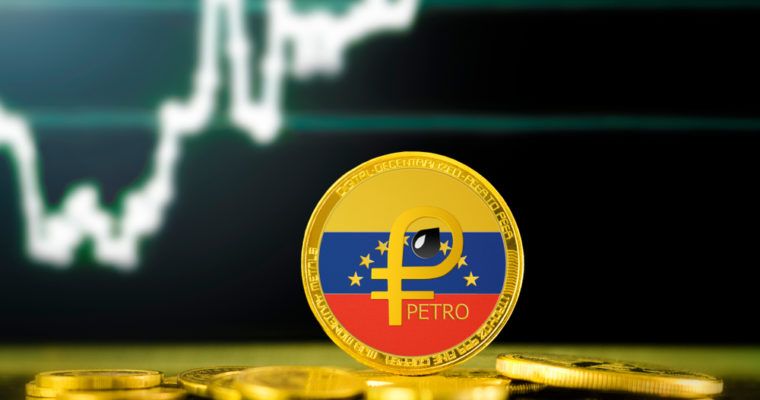Venezuela’s Oil-Backed Crypto Petro Grows Thanks to a Little-Known Russian Bank
Venezuela’s oil-backed cryptocurrency, the Petro (PTR), has been surviving thanks to a little-known Russian bank, Evrofinance Mosnarbank, which has recently emerged as the only international financial institution willing to defy the US’ sanctions against the South American nation.
According to an Associated Press report, early would-be Petro investors who registered with Venezuela’s government and downloaded the cryptocurrency’s wallet were invited to buy it by wiring a €1,000 (about $1,190) minimum to a government-owned account at Evrofinance. The bank’s involvement seemingly further ties Russia with the Petro’s launch.
As covered, reports suggest Russia secretly helped Venezuela launch the oil-backed cryptocurrency, while a Russian official refuted the country’s involvement. Notably, Evrofinance’s biggest shareholders are two state-controlled Russian banks – sanctioned after Russia’s annexation of Crimea – and Venezuelan leader Nicolas Maduro, as the country’s government purchased a 49% stake in 2011.
As Russia’s involvement was being discussed, the Russian Association of Cryptocurrency and Blockchain awarded the Venezuelan government the Satoshi Nakamoto prize, as covered by CCN. Russia’s involvement, according to the Associated Press, may be linked to its relations with the west.
Per Claiborne W. Porter, the former head of the US Justice Department’s bank integrity unit, the country is increasingly gaining pariah status with the European Union and the US. Porter stated:
“Like kids on the playground, Venezuela and Russia think they are fighting a common bully in U.S. sanctions, so they’re going to try and form a united front.”
Historically, Russia has helped Venezuela with billions in debt relief, and is a major investor in the country’s oil industry. It has been a lifeline for Maduro, who’s currently on the verge of dealing with more sanctions coming from the Trump administration, if it goes ahead with presidential elections this month.
Back in March, Trump banned US citizens and residents from buying the oil-backed cryptocurrency, a move that Venezuela claims to have been “free publicity” that doubled the number of interested investors.
According to the Associated Press, after it inquired Evrofinance on its association with the Petro, all references to it were removed from the Petro’s wallet, which left interested buyers with no guidance on how to proceed.
The Petro’s development
While it is unclear how many Petros the Venezuelan government has actually sold, Maduro has touted the cryptocurrency’s pre-sale raked in $5 billion. These numbers, as shown, don’t add up. Moreover, most foreigners agree that the oil-backed cryptocurrency is of little interest to them, and the century-old think tank Brookings Institute has even stated it undermines legitimate cryptocurrencies
Reports suggest popular cryptocurrency exchanges like Bitfinex have been staying away from it, for fear they would be violating sanctions. According to experts, only criminals would be interested in the Petro. Venezuelan-born computer scientist and cryptocurrency startup consultant Alejandro Machado stated:
“An overwhelming majority of ICOs don’t deliver on what they promise because their promoters are outright scammers or fall short on technical expertise. In the case of the Venezuelan government, both reasons apply.”
Speaking to the Associated Press, the two Russians who reportedly signed agreements with Maduro the help the Petro expand globally distanced themselves from the cryptocurrency with one, Fedor Bogorodskiy, claiming his company immediately ceased working with the project as soon as Trump announced his ban.
Despite its status, Maduro keeps moving the Petro forward. He’s given state-owned institutions a 120-day period to start accepting it as legal tender in all transactions, and is set to create 16 local exchanges where Venezuelans will be able to exchange their depreciating fiat currency for the Petro. As covered, he offered the Indian government a 30% discount on crude oil, if it paid in Petro.
The Venezuelan government has in the past revealed it was working on another cryptocurrency, backed by the country’s gold reserves, the Petro Gold. The move is seen by some as a way to draw in foreign investment and bypass sanctions. Venezuela’s moves were even slammed by Bitcoin.com CEO Roger Ver.
Yuri Pripachkin, president of Russia’s blockchain group, noted that the Kremlin is keeping a close eye on the Petro, but isn’t involved in it. Nevertheless, he dismissed the idea that it could be used to fund criminals. He said:
“That’s a fairy tale. The most popular currency for terrorists and criminals the world over is the U.S. dollar, not crypto, and nobody is suggesting we ban dollars. This is just an attempt to stop crypto from expanding.”